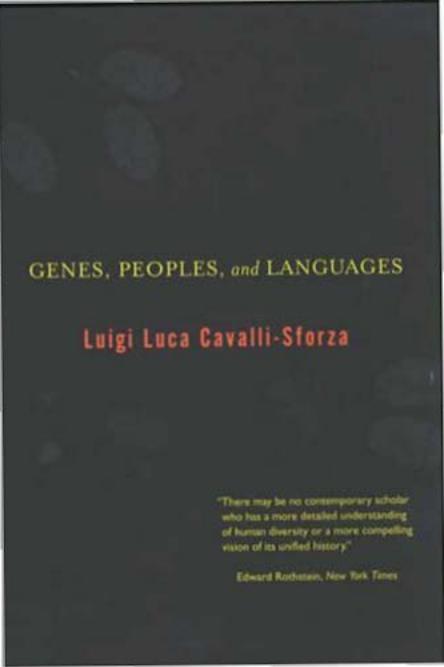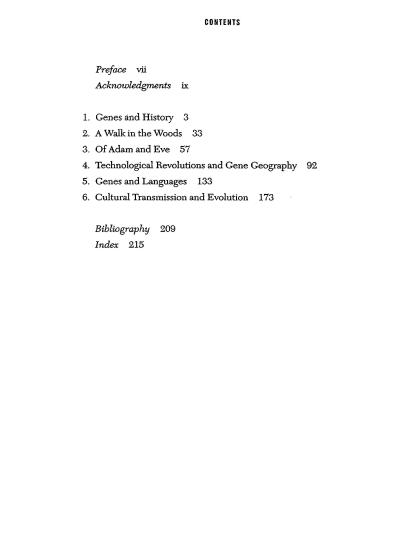
1cavalli_sforza_luigi_luca_genes_peoples_and_languages
.pdf
PENGUIN BOOKS
GENES, PEOPLES AND LANGUAGES
'There may be no contemporary scholar who has a more detailed understanding of human diversity or a more compelling vision of its ·unified history ... TI,is project is an immense intellectual achievement, and Genes, Peoples and Languages
is a fine way to get a sense of its scope' Edward Rothstein,
The New York Times
'It challenges us to define what we understand of "race" and its author has for nearly half a century made seminal contributions to the study of evolutionary genetics, in addition to possesshlg a most wondelful talent for telling a great story' Gear6id Tuohy,
Irish Times
'Luigi Luca Cavalli-Sforza's latest book summarizes the life work of this fascinating polymath, who for the last fifty-five years has been developing ingenious methods to understand the history of everybody ... Genes, Peoples and Languages is, among other things, an intellectual biography - a complex portrait of. scientist capable of mentally juggling the particulars about everything and everybody, while remaining continually alert to grand designs' Jared Diamond, New York Review of Books
'The author has long been at the forefront of research that uses human genetics as a way of unravelling our past. In this short, lucid book he describes the insights that have been gained about the way our species evolved and spread, leading to.different races, cultures and languages' Andrew Crumey, Scotland on Sunday
ABOUT THE AUTHOR
The world's leading expert on human population genetics, Luigi Luca Cavalli-Sforza was born in Genoa in '1922 and has taught at the universities of Cambridge, Parma and Pavia. He is currently active Professor Emeritus of Genetics at Stanford University and is the author of The Hi$tory and Geogro:phy of Hu11Ul1I Genes. He is a Foreign Member of the Royal Society.
Genes, Peoples and Languages
Luigi Luca Cavalli-Sforza
Translated by Mark Seielstad
PENGUIN BOOKS
."~' <."


Preface
This book surveys the research on human evolution from the many different fields of study that contribute to our knowledge. It is a history of the last hundred thousand years. relying on archeology, genetics, and Imguistics. Happily. these three diSciplines are now generating many new data and insights. All of them can be expected to converge toward a common story. and behind them must lie a single history. Singly, each approach has many lacunae. but hopefully their synthesis can help to flll the gaps. Other sciences--cultural anthropology. demography. economy, ecology. SOciology-are joining in the effort. and are justly becoming pillars of interpretation.
It would be impossible to communicate the conclusions about human history and the causes of human evolution if one had to rely on the jargons of such diverse diSCiplines. Scientific terminology insures precision and increases the speed of communication among specialists. but it creates a barrier between them and the general public. I have tried to restrict my use of jargon to a minimum, and I have also attempted to explain terms and methods unknown to the
VII
general public. 'I1,e response to foreign editions of this book (in French, Italian, Spanish, and German) indicates that most readers have no difficulty in follOwing the science presented here, and can appreciate multidisciplinarity.
To some, history (including evolution) is ~ot a science, because its results cannot be replicated and thus cannot be tested by the experimental method. But studying the same phenomenon from many different angles, from many diSciplines, each. of which supplies independent facts, has the value oflargely independent repetition. This makes the multidisciplinary approach indispensable.
An important conclusion that emerges from this work is that human genetic evolution has been heavily affected by technolOgical innovations and by cultural change, in general. Culture, meaning the accumulation ofknowledge over generations, is the main difference between humans and other animals (the difference is one of degree, because animals, too, learn during their lives and transmit knowledge to future generations). Cultural transmission "is thus an important object of study, one that has been dramatically neglected. Chapter 6 is devoted to it.
'I1,e subject of this book has significant implications for important social problems. It explains, among other things, why racism is fallacious. Genetics is instrumental in shaping us, but so, too, are the cultural, social, and physical environments in which we live. The main genetic differences are between individuals and not between populations, or so-called "races.» Differences of genetic origin among the latter are not only small (rapidly becoming even smaller with the recent acceleration of transportation, and both migratory and cultural exchange) but "also superficial, attributable mostly to responses to the different climates in which we live. Moreover, there are serious difficulties in distingnishing between genetic and cultural differences, between nature and nurture.
My greatest hope is that the reader experiences the same intellectual pleasure I have with each expected and unexpected finding, uncovering so many points of agreement among diSciplines that have been kept carefully separate for so long.
VIII
